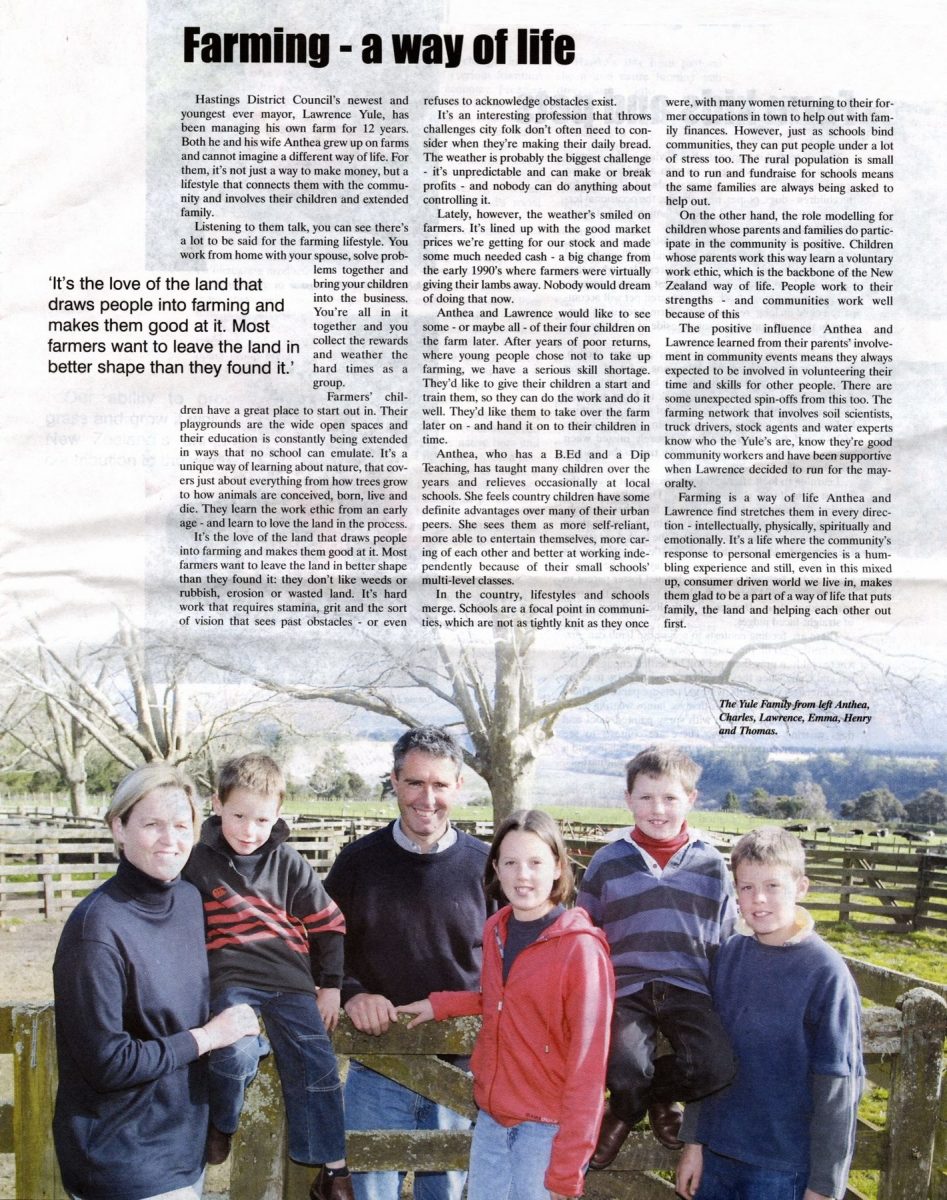Farming – a way of life
Hastings District Council’s newest and youngest ever mayor, Lawrence Yule, has been managing his own farm for 12 years. Both he and his wife Anthea grew up on farms and cannot imagine a different way of life. For them, it’s not just a way to make money, but a lifestyle that connects them with the community and involves their children and extended family.
Listening to them talk, you can see there’s a lot to be said for the farming lifestyle. You work from home with your spouse, solve problems together and bring your children into the business. You’re all in it together and you collect the rewards and weather the hard times as a group.
‘It’s the love of the land that draws people into farming and makes them good at it. Most farmers want to leave the land in better shape than they found it.’
Farmers’ children have a great place to start out in. Their playgrounds are the wide open spaces and their education is constantly being extended in ways that no school can emulate. It’s a unique way of learning about nature, that covers just about everything from how trees grow to how animals are conceived, born, live and die. They learn the work ethic from an early age – and learn to love the land in the process.
It’s the love of the land that draws people into farming and makes them good at it. Most farmers want to leave the land in better shape than they found it: they don’t like weeds or rubbish, erosion or wasted land. It’s hard work that requires stamina, grit and the sort of vision that sees past obstacles – or even refuses to acknowledge obstacles exist.
It’s an interesting profession that throws challenges city folk don’t often need to consider when they’re making their daily bread. The weather is probably the biggest challenge – it’s unpredictable and can make or break profits – and nobody can do anything about controlling it.
Lately, however, the weather’s smiled on farmers. It’s lined up with the good market prices we’re getting for our stock and made some much needed cash – a big change from the early 1990’s where farmers were virtually giving their lambs away. Nobody would dream of doing that now.
Anthea and Lawrence would like to see some – or maybe all – of their four children on the farm later. After years of poor returns, where young people chose not to take up farming, we have a serious skill shortage. They’d like to give their children a start and train them, so they can do the work and do it well. They’d like them to take over the farm later on – and hand it on to their children in time.
Anthea, who has a B.Ed and a Dip Teaching, has taught many children over the years and relieves occasionally at local schools. She feels country children have some definite advantages over many of their urban peers. She sees them as more self-reliant, more able to entertain themselves, more caring of each other and better at working independently because of their small schools’ multi-level classes.
In the country, lifestyles and schools merge. Schools are a focal point in communities, which are not as tightly knit as they once were, with many women returning to their former occupations in town to help out with family finances. However, just as schools bind communities, they can put people under a lot of stress too. The rural population is small and to run and fundraise for schools means the same families are always being asked to help out.
On the other hand, the role modelling for children whose parents and families do participate in the community is positive. Children whose parents work this way learn a voluntary work ethic, which is the backbone of the New Zealand way of life. People work to their strengths and communities work well because of this.
The positive influence Anthea and Lawrence learned from their parents’ involvement in community events means they always expected to be involved in volunteering their time and skills for other people. There are some unexpected spin-offs from this too. The farming network that involves soil scientists, truck drivers, stock agents and water experts know who the Yule’s are, know they’re good community workers and have been supportive when Lawrence decided to run for the mayoralty.
Farming is a way of life Anthea and Lawrence find stretches them in every direction – intellectually, physically, spiritually and emotionally. It’s a life where the community’s response to personal emergencies is a humbling experience and still, even in this mixed up, consumer driven world we live in, makes them glad to be a part of a way of life that puts family, the land and helping each other out first.
The Yule Family from left: Anthea, Charles, Lawrence, Emma, Henry and Thomas.












Do you know something about this record?
Please note we cannot verify the accuracy of any information posted by the community.